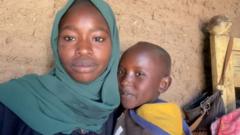A jury in El Salvador has convicted three ex-military officers for the 1982 killings of Dutch journalists, bringing attention to a long-overlooked case from the Salvadoran civil war. They received 15-year prison sentences with the ruling shedding light on the historical injustices faced by journalists during armed conflicts.
El Salvador's Historic Conviction of Military Officers in Dutch Journalists' Murders

El Salvador's Historic Conviction of Military Officers in Dutch Journalists' Murders
Three former Salvadoran military officials have been sentenced for their roles in the 1982 murders of four Dutch journalists, marking a significant step in the pursuit of justice.
A jury in El Salvador has delivered justice after more than four decades by convicting three former military officers for the 1982 murders of four Dutch journalists. The officers - General José Guillermo García, 91; Colonel Francisco Morán, 93; and Colonel Mario Adalberto Reyes Mena, 85 - were found guilty and each sentenced to 15 years in prison for their roles in the tragic killing of the journalists who were documenting the Salvadoran civil war.
The verdict was announced on June 4, 2025, by the Comunicándonos Foundation, which has been dedicated to seeking accountability for the case. Both General García and Colonel Morán are currently detained in El Salvador, having been arrested in 2022, while Colonel Reyes Mena awaits extradition from Virginia, according to Dutch governmental sources.
The Dutch journalists, identified as Koos Koster, Jan Kuiper, Joop Willemsen, and Hans ter Laag, were ambushed by Salvadoran soldiers on March 17, 1982, while traveling with guerrilla fighters in Chalatenango. Initial reports from the Salvadoran army falsely claimed the journalists were killed during an exchange of fire initiated by their guerrilla companions, but a 1993 United Nations Truth Commission report exposed the military's premeditated ambush, implicating Colonel Reyes Mena as a key figure in orchestrating the attack.
Witness accounts from the scene and physical evidence underscored the brutality of the killings, prompting widespread outrage in the Netherlands. The emotional aftermath resonated deeply with the public, as the notion of a government murdering journalists seemed unfathomable to many Dutch citizens.
Diplomatic reactions followed swiftly; Arjen van den Berg, the Dutch ambassador to Costa Rica and El Salvador, reflected on the anger felt in the Netherlands post-tragedy, recognizing how the murders represented a severe breach of journalist safety. Dutch officials expressed their relief, highlighting the significance of this ruling in the broader fight against impunity, as reflected in sentiments shared by Caspar Veldkamp, the outgoing Dutch Minister of Foreign Affairs.
This verdict signals a crucial moment in both remembrance and accountability, serving as a reminder of the grave risks journalists face in conflict zones, and the ongoing struggle for justice amidst historical injustices. As more details emerge, the significance of this case continues to unfold, reinforcing the commitment to safeguarding the rights and lives of journalists worldwide.



















